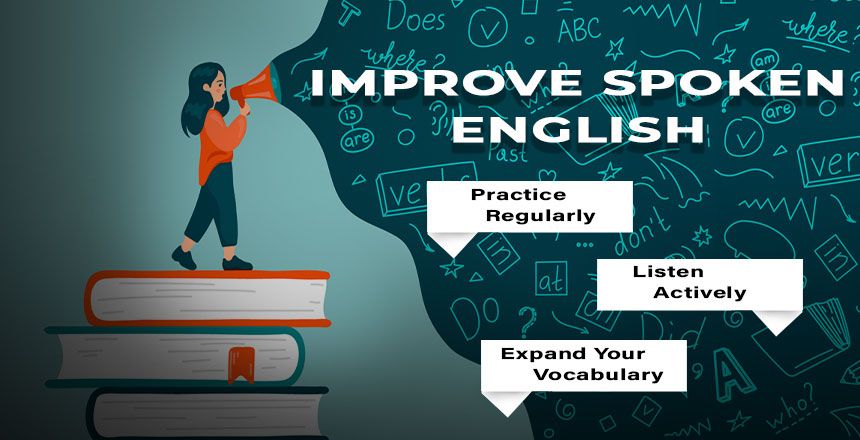How to Improve Spoken English

An Introduction to Computers: Hardware and Networking
The English learners’ target is to be able to speak English without fear or hesitation. However, as much as one may need to enhance their spoken English skills, this could be very difficult to do on their own. In this blog post, I will give you 10 tips that you can use to tip up your English-speaking skills.
1. Listen to English regularly.
Listening to English speech By far, one of the most effective strategies for enhancing the fluent speaking of English is to listen to as much English speech as possible. Start watching English news, shows, movies, listen to radio programs, podcasts, songs, and all English programs. When listening actively, the focus should be on such things as pronunciation, grammar, the words used, as well as such typical sentences as those given in the exercise above. Listening makes your ear familiar with the sounds of the English language and different patterns that are there in the English language.
2. Read a loud
This is one of the best ways for improving the pronunciation and function of English sentences. Oral observations should begin with how the mouth and lips operate when reading; pay attention to how one pronounces sounds and words. Observing the movements of the mouth will facilitate this while speaking. Moreover, involve a lot of stress, rhythm, and intonation when reading. Use your phone and have the recorder on, and then speak and listen for areas that need to be changed.
3. Have conversations.
Speaking is important, but using the language more is important, and that is why normal conversation in English is important. Firstly, try looking for another person who is also taking the TOEFL course to communicate with on a regular basis, either on Skype or face-to-face. It should be noted that first and second language speakers can be good conversational partners for both parties, as well as Native English speakers. Start by having a simple conversation. Rehearse simple things, like weather, food, or some other interest. Lakatos paraphrases what has been said so you can better understand the message of the speaker and then ask follow-up questions as applicable. The best way to practice NS is that the more often one practices speaking English, the better she or he will get.
4. Such: use of common expressions and phrases
It may be useful to attempt to use more often-used expressions and recognized phrases of the English language during conversations. Examples of this include phrases like ‘How are you?’ ‘Staying strong’ and ‘No problem’ to take away some of the issues of having conversations. Study: introductions/ccontinuations of conversations, simple assertions, disagreements, and polite closings. If new expressions are used constantly, they will become a ‘fixture’ in your everyday language usage.
5. Work on tongue twisters
There is nothing quite like a good tongue twister, such as when she sells seashells by the seashore to work your mouth muscles! The use of these tongue twisters assists in enhancing the clarity of standard consonants and vowels, which are inconsequential in informal speech. Choose the ones that are hard for you to hear, or you just learned it and you are still practicing. Read out the following tongue twisters aloud at a good speed, trying to say each of them in one go as many times as you are capable of it. If you want to get your mouth familiar with English movements, doing a few minutes of tongue twisters each day is the best way.
6. Sing songs
One of the fun ways of merely speaking English is singing all the favorite English pop tunes. When singing the lyrics of the chorus and verses, you actually vocalize several English vowels, consonants, and patterns. Select songs with dynamic where most of the words are indeed recognizable. Be sure to go get the lyrics and read them while listening to enhance your understanding of the content. When people sing repeatedly the lyrics of a song, the subsequent flowery phrases are as easily communicated in conversation as normal English.
7. Do voice recordings
Improving accent in English When you read English aloud or just speak English, it’s a great idea to record your voice and then listen to how you sound. Choose a short story or an article, then record yourself after reading the story and summarize it in the words of your own. Meanwhile, for the vocabulary, grammar, and pronunciation, students should listen carefully after that. During the assessment, you may encounter some difficulties, and you will listen to the records multiple times just to track the changes. During rehearsal, you want to sound natural and clear.
8. Find language partners
Speaking English with a language-learning partner is very effective. HelloTalk is another app that partners you with native speakers who are equally learning your language; you communicate using text, voice, and video calls. Siblings/friends do correct your grammar and pronunciation errors during the fluent talking in a repetitive manner. It also reconstructs what you know when you teach them your language. At least one daily conversation in that language enhances the journey to fluency in spoken English in a significant way.
9. Use mirrors and recordings
Observe your jawline and facial muscles in the mirror and on videos so that you focus on the part of your speaking that you can actually watch. Pay attention to how you move your face and body while speaking and if you look stiff and uncomfortable. Even facial movements such as looking into the eyes and moving head and hand signals should also be observed. By checking the visual items, one is able to pay attention to the fact that one looks and feels comfortable when making the speech. When people are comfortable in how they move and posture, then discussions are much less difficult.
10. Think in English
For instance, anytime you go through your normal routine, always try to speak to yourself in
English instead of your native language. Whether you are going to the supermarket, to work, or
at home, narrate to yourself in English mental sentences such as “I am currently boiling rice”
or
“I searched my car; where could I have put the keys? Performing this thinking habit
coassociates English thoughts with their words so that the student has an easier time speaking
the language.
Using these enjoyable, realistic routines every day motivates your mouth, Westernizes your
speech, and awes you for utilizing English. In the transition process, it can be stressful, but
Schlossberg (2012) says to be patient with yourself. Practising any language over time is
essential for success; one will get a better result if they keep on applying efforts. The
language
learning process should incorporate proper strategies because people should really get down
the components of spoken English. Always be encouraged by documenting your successes, no
matter how small, and always remember the goals why learning English is important. You’ve got
this!









